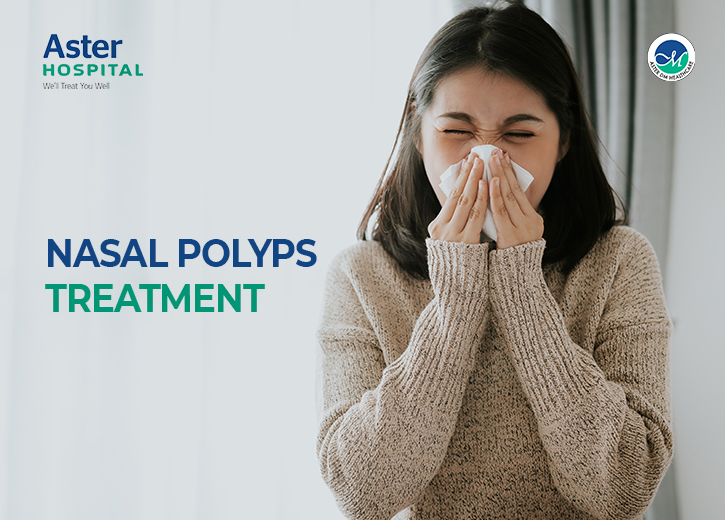Nasal polyps are painless and non-cancerous growths on the lining of the nasal passages. The growths are formed from mucus membranes.
People may not develop nasal polyps’ until they enter their 30s or 40s. The condition is caused due to inflammation in the nose, such as
- Sinus infections
- Asthma
- Hay fever
- Cystic fibrosis
- Chronic rhinosinusitis
Common Symptoms of nasal polyps:
- Headaches.
- A runny nose
- Loss of smell or taste.
- Pain in upper teeth
- Snoring.
- Nose bleeding.
- Facial pain or headache.
- Postnasal drip.
- Sleeping trouble even in non-asthmatic people
If you experience these symptoms, always consult an ENT doctor in Dubai. Aster Hospital is one of the best hospitals in Dubai for the treatment of nasal polyps.
Diagnoses and treatment of nasal polyps :
Doctors often use a lighted instrument called an otoscope to check the nasal passages. Furthermore, they may perform a nasal endoscopy if the polyp is deeper in the sinuses. During the process, the doctor will insert these objects into the nasal passages:
- A thin, flexible tube with a light and camera.
The exact size and location of the polyp may be determined through an MRI or CT scan. These scans can also reveal whether the polyp deformed the bone in the affected area.
Allergy tests :
Doctors will perform allergy tests to determine the source of persistent nasal inflammation. Allergens in the liquid form are used in this type of treatment. Moreover, the liquid is deposited in the skin by making tiny pricks. In addition, doctors will also check the immune system for any kind of reaction due to the treatment.
In the case of a very young child, tests for a genetic disease may be necessary if they experience nasal polyps.
Treatment:
Doctors will first prefer medications to treat nasal polyps. But, surgery may be required if they don’t work. It is observed that nasal polyps often return even after successful treatment.
Drug treatments:-
Nasal corticosteroids
This treatment includes the usage of a corticosteroid nasal spray to reduce swelling and irritation. In addition, a nasal corticosteroid may eliminate polyps.
Some of the good nasal corticosteroids include
- Fluticasone
- Budesonide
- Mometasone
- Triamcinolone
- Beclomethasone
- Ciclesonide
Oral and injectable corticosteroids
A doctor may suggest an oral corticosteroid treatment if a nasal corticosteroid isn't effective. The treatment can be carried out alone or with a nasal spray.
Things to remember:
- The treatment is suggested for a limited time as it can cause serious side effects.
- In case of severe nasal polyps, doctors may use injectable corticosteroids.
Medication to treat nasal polyps and chronic sinusitis
Doctors may inject a medication known as dupilumab (Dupixent) if someone experiences nasal polyps chronic sinusitis. This medication may reduce nasal congestion and reduce the size of nasal polyps.
Other medications Different drugs may be used to treat long-term swelling in the sinuses or nasal passages. The drugs may include antihistamines to treat allergies and antibiotics to treat chronic infection. Endoscopic surgery may be if medications fail to cure nasal polyps.



